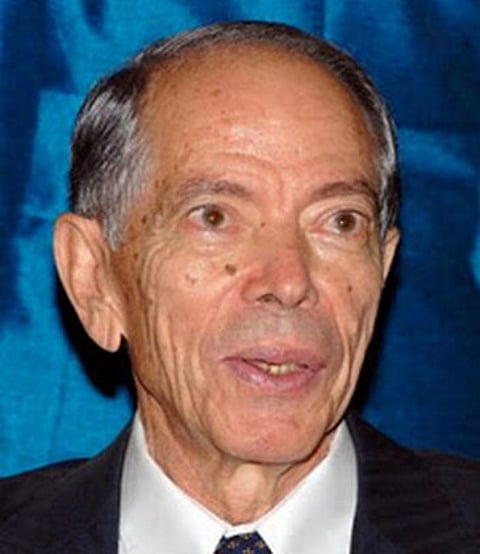Mubarak’s maverick confidant Osama Al Baz dies
Osama Al Baz served for more than 20 years as political advisor to the president

Cairo: Egypt’s stalwart politician Osama Al Baz, who passed away on Saturday at 82, has left behind a controversial, decades-old legacy. Having served for more than 20 years as political advisor to the now-ousted president Hosni Mubarak, Al Baz is depicted by detractors as a phony reformist who had an alleged stake in keeping the regime in place while backing cosmetic changes.
Al Baz’s backers, however, praise him as a reformist politician with a vision, who quit his post nine years before the 2011 uprising that toppled Mubarak because he was displeased with the former strongman’s way of ruling.
Mubarak, who ruled Egypt for nearly 30 years, was widely believed to have groomed his younger ambitious son, Jamal, to succeed him in power.
“I was not a supporter of hereditary succession. This issue was one of the main reasons why I left the presidential establishment,” Al Baz told independent newspaper Al Masry Al Youm in a 2012 interview. “I do not deny that Mubarak had tasked me with grooming Jamal in politics, but I was not among those who backed his bid to be president.”
Born in the Nile Delta province of Dakahlia in 1931, Al Baz obtained a degree in law at Cairo University in 1954. He pursued post-graduate studies in law at the Harvard University in the US. He initially worked as an attorney before starting a career as diplomat in 1958.
Diplomatic ranks
He rose in diplomatic posts, working as director of the foreign minister’s office and later as an aide to Mubarak when he was named in 1975 as deputy to president Anwar Al Sadat.
Mubarak, who became president in 1981, later named Al Baz as his political advisor, a post he held for more than two decades.
Al Baz, known as Mubarak’s confidant, was a frequent speaker at political and cultural seminars. However, he stayed away from the public eye in the years that followed his departure from presidency.
Days after the beginning of the anti-Mubarak uprising, Al Baz showed up in Cairo’s Tahrir Square, the epicentre of the revolt, where he praised the protesters.
“Mubarak could have avoided this had he listened to my advice in early 2002 when I told him not to run for presidency again and to begin gradual transfer of power,” Al Baz said in the 2012 interview.
Key mediator
Nicknamed the doyen of Egyptian diplomacy, Al Baz participated in Egyptian-Israeli negotiations that led to a peace treaty in 1979 between the two countries. He was long responsible for mediating between Palestinians and Israelis.
The Foreign Ministry on Saturday paid tribute to Al Baz, calling him a “devoted patriot”.
Al Baz is survived by his wife Omaima Tamam, a TV presenter. Veteran actress Nabeela Ebeid has recently said that she was married to Al Baz secretly for nine years.
He was buried in Cairo later on Saturday after a funeral attended by his brother Farou Al Baz, a Nasa researcher, as well as senior diplomats, including head of the Arab League Nabeel Al Arabi, Egypt’s Foreign Minister Nabeel Fahmy and former presidential contender Amr Mousa.



